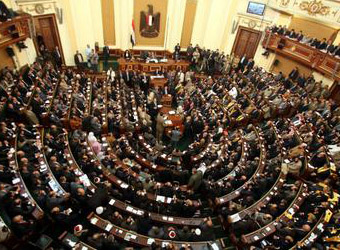A group of liberal and leftist political parties decided on Monday to forgo their seats in the assembly that will write Egypt’s new constitution, in protest at what they called the over-representation of Islamists in the body.
Islamists hit back, saying the group had gone back on an agreement concluded last week. The row cast a new shadow over a process that has been held up since April by a tussle between the Islamist parties which dominate parliament and other groups.
Criticizing the blueprint for the division of the seats in the 100-member body due to be picked on Tuesday, groups including the liberal Free Egyptians Party said they would not take part at all and instead would hand their seats to women, Christians, workers, peasants and others – sections of society they said had been denied representation.
Pressure from the ruling military council on the parties to overcome their differences resulted last week in what appeared to be an agreement on how the assembly should be formed.
The deadlock over the constitutional assembly has held up a central element of the transition to civilian rule mapped out by the military council that assumed power from Hosni Mubarak on Feb. 11, 2011.
The new constitution will replace the one that underpinned Mubarak’s three decades in power. Up for debate are crucial questions such as the extent of presidential powers and whether the parliament might be given new authority.
The generals are due to hand power to a new head of state on July 1. The identity of the new president will be decided on Saturday and Sunday by a run-off vote between Ahmed Shafik, Hosni Mubarak’s last prime minister, and Mohamed Mursi, the Muslim Brotherhood’s candidate.
In a statement, the liberal and leftist parties said an initial agreement to divide the 100 seats equally between Islamist parties and non-Islamist groups masked a different reality.
They had subsequently found out that two Islamist parties had been included in the quota of seats set aside for leftist and liberals, together with the state’s main Islamic and Christian institutions.
The signatories “held the military council responsible for the erroneous path that led us to this crisis”, the statement said.
“We also hold the Muslim Brotherhood responsible for resolving this crisis which escalated because of the Brotherhood’s insistence on domination and rejection of consensus”.
Islamists said that Liberals were the ones who had overturned the agreement they approved earlier.
“We haven’t breached any agreement … clearly they agreed on something then changed their minds and want to backtrack and they have no right to backtrack,” Sayed Khalifa, an MP from al-Nour party, said during a session on Monday.
The Muslim Brotherhood and al-Nour, a more hardline Salafi Islamist group, won some 70 percent of the seats in the upper and lower houses of parliament in elections that ran from November to February.
Under Egypt’s interim system of government, the Islamists’ strength in parliament gave them a big say over the shape of the constitutional assembly. Non-Islamists accused them of exploiting their position to squeeze others out of the body and filed a lawsuit that resulted in the process being suspended.
Both chambers of parliament are set to hold a joint meeting tomorrow to choose members of the assembly.


